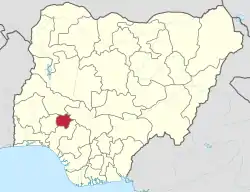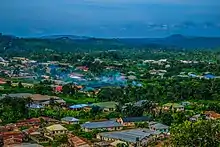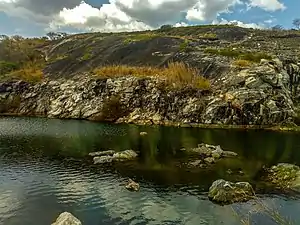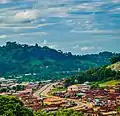Ekiti State
Ekiti State is in Southwest region of Nigeria, declared a state on 1 October 1996 alongside five other states in the country by the then military government under head of state, General Sani Abacha. As one of the newest states of the Nigerian federation, it was carved out of the territory of old Ondo State, and covers the former 12 local government areas that made up the Ekiti Zone of old Ondo State. On creation, it had 16 Local Government Areas (LGAs), having had an additional four carved out of the old ones. Ekiti State is one of the 36 states (inc. Federal Capital Territory (Nigeria)) that constitute Nigeria.[3]
Ekiti | |
|---|---|
 Flag | |
| Nicknames: Land of Honour & Integrity, | |
 Location of Ekiti State in Nigeria | |
| Coordinates: 7°40′N 5°15′E | |
| Country | |
| Date created | 1 October 1996 |
| Capital | Ado Ekiti |
| Government | |
| • Governor (List) | John Olukayode Fayemi (APC) |
| • Deputy Governor | Otunba Bisi Egbeyemi |
| • Senators |
|
| Area | |
| • Total | 6,353 km2 (2,453 sq mi) |
| Area rank | 31st of 36 |
| Population (2006 Census) | |
| • Total | 2,210,957 |
| • Rank | 29th of 36 |
| • Density | 350/km2 (900/sq mi) |
| Demonym(s) | Ekitian |
| GDP (PPP) | |
| • Year | 2007 |
| • Total | $2.85 billion[1] |
| • Per capita | $1,169[1] |
| Time zone | UTC+01 (WAT) |
| Dialing Code | +234 |
| ISO 3166 code | NG-EK |
| HDI (2018) | 0.611[2] medium · 13th of 37 |
Following a prolonged political crisis, President Olusegun Obasanjo imposed a military administrator (General Tunji Olurin) on Ekiti State in October 2006.[4] On 27 April 2007, Olurin was replaced by Tope Ademiluyi. In the PDP primary of 2006, the first-place finisher Yinka Akerele and second-place finisher Prof. Adesegun Ojo were supposed to be in a run-off to determine who would be the nominee of the Nigerian ruling party when President Obasanjo summoned them to Abuja and imposed the candidate who came third, Engineer Segun Oni.[5] He was later elected in the 2007 election as the governor of the state in an election marred by widespread irregularities although the APC candidate, Dr. Kayode Fayemi challenged his election and forced a rerun in May, 2009.[6]
The May 2009 rerun was characterized by even worse rigging and the election was disputed again. Eventually, after three years, the election of Oni was thrown out and Dr. Fayemi was declared the duly elected governor of Ekiti State.[7]
The prominent private university in Ekiti State is Afe Babalola University, Ado–Ekiti[8] (ABUAD), founded by the lawyer, philanthropist, administrator, and farmer Afe Babalola, #SAN.[9]
History
Ekiti was an independent state prior to the British conquest. It was one of the many Yoruba states in what is today Nigeria. The Ekiti people as a nation and districts of Yoruba race trace some of her progeny to Oduduwa, the father and progenitor of Yoruba race even though good reason appear to establish the existence of aboriginal people in Ekiti region prior to influx of royalty from present day Ile Ife as that kingdom grew and abound.
There are two major schools of thought regarding Ekiti history. First was the story that tied the origin of Ekiti to Ife. The story goes that the Olofin, one of the sons of Oduduwa had 16 children and in the means of searching for the new land to develop, they all journeyed out of Ile-Ife as they walked through the Iwo - Eleru (Cave of Ashes) at Isarun and had stop over at a place called Igbo-Aka (forest of termites) closer to Ile-Oluji.
The Olofin, the 16 children and some other beloved people continued with their journey, but when they got to a particular lovely and flat land, the Owa-Obokun (the Monarch of Ijesha land) and Orangun of Ila decided to stay in the present Ijesha and Igbomina land of in Osun state. While the remaining 14 children journeyed onwards and later settled in the present day Ekiti land. They discovered that there were many hills in the place and they said in their mother's language that this is "Ile olokiti" the land of hills. Therefore, the Okiti later blended to Ekiti. So Ekiti derived her name through hills.
It must however be noted, that this history may describe the history of certain royalty in present-day Ekiti, but not all of Ekiti which is made up of 131 Principal towns, with their own royalty and many land-owning communities with no royalty at all. In fact, the invading royalties from the East went on to colonize and transform the aboriginals, distinguishing the Ekiti dialect upon mix-up with the Ife/Oyo tongue of the Yorubas according to Samuel Johnson, the renowned historian of early Yoruba States and Affairs
Second school of thought on Ekiti origin is more likely and grounded in actual history. It was said that Oduduwa, the ancestor of the Yoruba traveled to Ife [Ife Ooyelagbo] where he met people who were already settled there. Among the elders he met in the town were Agbonniregun [Stetillu], Obatala, Orelure, Obameri, Elesije, Obamirin, Obalejugbe just to mention a few. It is known that descendants of Agbonniregun [Baba Ifa] settled in Ekiti, examples being the Alara and Ajero who are sons of Ifa. Orunmila [Agbonniregun] himself spent a greater part of his life at Ado. Due to this, we have the saying ‘Ado ni ile Ifa’ [Ado is the home of Ifa]. The Ekiti have ever since settled in their present location.[10]
Nobody can give accurate dates to these events due to the lack of written sources, but people have lived in Ekiti for centuries. It is on record that Ekiti Obas had prosperous reign in the 13th century. An example was the reign of Ewi Ata of Ado-Ekiti in the 1400s.
About the Ekitis, Samuel Johnson had this to say:
"Historically, the Ekitis are among the aboriginal elements of the Nigeria absorbed by the invaders from the East (Yoruba people from Ile Ife). "The term Ekiti denotes a "Mound", and is derived from the rugged mountainous feature of that part of the country. It is an extensive province and well watered, including several tribes and families right on to the border of the Niger, eastward. They hold themselves quite distinct from the Ijesas, especially in political affairs." (Samuel Johnson, The History of the Yoruba, 1921). It is believed that the ancestors of Ekiti people who came to combine with the aboriginal people on the land migrated from Ile Ife, the spiritual home of the Yoruba people. According to oral and contemporary written sources of Yoruba history, Oduduwa, the ancestor of the Yoruba traveled to Ife [Ife Ooyelagbo] where he met people who were already settled there. Among the elders he met in the town were Agbonniregun [Stetillu], Obatala, Orelure, Obameri, Elesije, Obamirin, Obalejugbe just to mention a few. It is known that descendants of Agbonniregun [Baba Ifa] settled in Ekiti, examples being the Alara and Ajero who are sons of Ifa. Orunmila [Agbonniregun] himself spent a greater part of his life at Ado. Due to this, we have the saying ‘Ado ni ile Ifa’ [Ado is the home of Ifa]. The Ekiti have ever since settled in their present location. The early Ekiti country is divided into 16 districts (and it has been maintained to this day), each with its own Owa or King (Owa being a generic term amongst them) of which four are supreme, viz. : — (1) The Owore of Otun, (2) The Ajero of Ijero, (3) The Ewi of Ado and (4) The Elekole of Ikole. The following are the minor Ekiti kings : — (5) Alara of Aramoko, (6) Alaye of Efon Alaye, (7) Ajanpanda of Akure, (8) Alagotun of Ogotun, (9) Olojudo of Ido, (10) Ata of Aiyede, (11) Oloja Oke of Igbo Odo, (12) Oloye of Oye, (13) Olomuwo of Omuwo, (14) Onire of Ire, (15) Arinjale of Ise and (16) Onitaji of Itaji. The Orangun of Ila is sometimes classed among them, but he is only Ekiti in sympathy, being of a different family."
The modern Ekiti state was formed from part of Ondo in 1996.[11] Prior to this, it was part of the Ondo Province in Western Region of Nigeria. While the non-Ekiti part of the region largely dominated geographically, Akure which was then regarded as an Ekiti town was the headquarters of Ondo province.
Geography

The State is mainly an upland zone, rising over 250 meters above sea level. It lies on an area underlain by metamorphic rock. It is generally an undulating part of the country with a characteristic landscape that consists of old plains broken by step-sided out-crops that may occur singularly or in groups or ridges. Such rocks out-crops exist mainly at Aramoko, Efon-Alaiye, Ikere-Ekiti, Igbara-odo- ekiti and Okemesi-Ekiti. The State is dotted with rugged hills, notable ones being Ikere-Ekiti Hills in the south, Efon-Alaiye Hills on the western boundary and Ado-Ekiti Hills in the centre.[12]
Climate and vegetation
The State enjoys tropical climate with two distinct seasons. These are the rainy season (April–October) and the dry season (November–March). Temperature ranges between 21° and 28 °C with high humidity. The south westerly wind and the northeast trade winds blow in the rainy and dry (Harmattan) seasons respectively. Tropical forest exists in the south, while savannah occupies the northern peripheries.[13]
Towns and administrative divisions
Local Government Areas
Ekiti State consists of sixteen Local Government Areas. They are:
Current list of Local Government Area Chairmen.[14]
1 Ise/Orun: Hon. Olumide Falade 2 Gbonyin: Hon. Sade Akinrinmola 3 Emure: Hon. Oludare Paul Awopetu 4 Ido-Osi: Hon. Chief Ayodeji Arogbodo 5 Oye: Hon. Tayo Ogundare 6 Irepodun/Ifelodun: Hon. Dapo Olagunju 7 Ado-Ekiti: Hon. Deji Ogunsakin 8 Ikere: Hon. Bola Alonge 9 Ekiti South West: Hon. Lanrewaju Omolase 10 Efon: Hon. Bolaji Jeje 11 Ilejemeje: Hon. Ganiyu Bakare 12 Ijero: Hon. Abiodun Dada 13 Ekiti East: Hon. Samuel Adeniyi 14 Ekiti West: Hon. Kolawole Omotunde 15 Moba: Hon. Adeniyi Adebayo 16 Ikole: Hon. Adesola Adeyanju [15]

Proposed 18 Local Council Development Areas (LCDAs) in Ekiti State
The Ekiti State Government in 2014, prior to the exit of the immediate past Governor Fayemi, was to create additional 18 LCDAs based on the recommendations of the White Paper Committee set up by the government. This has, however, been cancelled by Governor Ayo Fayose.
Demographics
Ekitis are culturally homogeneous and they speak a dialect of Yoruba language known as Ekiti. The homogeneous nature of Ekiti confers on the state some uniqueness among the states of the federation. Slight differences are noticeable in the Ekiti dialects of the Yoruba language spoken by the border communities to other states. For example, the people of Ado local government area do not speak exactly the same dialect with the people of Ijero Local government area, while the people of Ikole area speak something different from the people of Ikere area. The communities influenced by their locations include Otun (Moba land) that speaks a dialect close to the one spoken by the Igbominas in Kwara State. The people of Oke-Ako, Irele, Omuo speak a similar dialect to that of Ijesas of Osun State. However, part of the uniqueness of the Ekitis is that wherever is your own part of the state, you will understand well, when the other Ekiti[8] man/woman speaks, in spite of the dialectal variations. In addition, all towns in Ekiti State take a common suffix, “Ekiti,” after their names.[16]
Languages
Languages of Ekiti State listed by LGA:[17]
| LGA | Languages |
|---|---|
| Ado-Ekiti | Ukue |
| Aiyekire | Ehueun; Iyayu; Iyive; Okpamheri |
| Akoko North East | Ukaan |
| Ekiti East | Àhàn; Arigidi; Okpamheri |
| Emure | Okpamheri |
| Ikere | Uhami |
| Irepodun-Ifelodun | Ukue |
| Ise-Orun | Okpamheri |
Akpes, Ayere, and Emai-Iuleha-Ora are also spoken in Ekiti State.[17]
Natural resources
Ekiti land is naturally endowed with numerous natural resources. The state is potentially rich in mineral deposits. These include granite, kaolinite, columbite, charnockite, iron ore, baryte, aquamarine, gemstone, phosphate, limestone, tourmaline, gold among others. They are largely deposited in different towns and villages of Ijero, Ekiti West, Ado - Ekiti, Ikole, Ikere, Ise-Ekiti and other Local Government Areas.
The Land is also blessed with water resources, some of its major rivers are Ero, Osun, Ose, and Ogbese. More so, a variety of tourist attractions abound in the state namely, Ikogosi Warm Springs; Arinta Water Falls; Olosunta and Orole hills of Ikere; Fajuyi Memorial Park of Ado - Ekiti and so on. The Ikogosi tourist centre is the most popular and the most developed. The warm spring is a unique natural feature, and supporting facilities are developed in the centre. The spring is at present, being processed and packaged into bottled water for commercial purpose by a private company - UAC Nigeria.
Moreover, the land is buoyant in agricultural resources with cocoa as its leading cash crop. It was largely known that Ekiti land constituted well over 40% of the cocoa products of the famous old Western Region. The land is also known for its forest resources, notably timber. Because of the favourable climatic conditions, the land enjoys luxuriant vegetation, thus, it has abundant resources of different species of timber. Food crops such as yam, cassava, and also grains like rice and maize are grown in large quantities. Other notable crops such as kola nut and varieties of fruits are also cultivated in commercial quantities.[18]
Gallery
 The Iworoko mountain
The Iworoko mountain Wooden Walkway of Ikogosi Cold and Warm Spring
Wooden Walkway of Ikogosi Cold and Warm Spring The elephant-like tree located beside Ado-Awaye suspended lake in Ado-Awaye
The elephant-like tree located beside Ado-Awaye suspended lake in Ado-Awaye Mountain view Ilawe Ekiti, Ekiti State
Mountain view Ilawe Ekiti, Ekiti State
Notable Ekiti indigenes
- Niyi Adebayo: former governor, first executive governor of Ekiti State, (the son of Robert Adeyinka Adebayo).
- Robert Adeyinka Adebayo: Ex Governor, Western Region and Western State of Nigeria, (the father of Niyi Adebayo).
- Odunlade Adekola: actor
- Alhaji Abdul Azeez Kolawole Adeyemo: prominent politician
- Sade Adu: musician
- Bolaji Aluko: professor
- Gbenga Aluko: senator
- Sam Aluko: economist and father to Bolaji Aluko and Gbenga Aluko
- Niniola Apata, musician and elder sister to Teniola Apata
- Teniola Apata, musician and younger sister to Niniola Apata
- Yinka Ayefele: musician
- Afe Babalola: senior advocate of Nigeria, philanthropist
- Rasak Ojo Bakare professor
- Richard Bamisile: Nigerian politician and member of the Federal House of Representatives.
- Babalola Borishade: 4-time Minister of the Federal Republic of Nigeria, CFR
- Adekunle Fajuyi : First Military Governor, Western Region of Nigeria - The Region is now divided to 6 States.
- Femi Falana: senior advocate of Nigeria, activist, (the father of Falz).
- Falz: musician, (the son of Femi Falana)
- Bunmi Famosaya: Chairman, Civil Service Commission Ekiti State & former Head of Service, Ekiti State.
- Olusoji Fasuba: sprinter and sports
- Kayode Fayemi: Governor Ekiti State
- Ayo Fayose: former governor of Ekiti State
- Oluyemi Kayode: sprinter
- Babafemi Ojudu: senator, current special adviser to president
- Senator Abiodun Olujimi: a senator of the Federal Republic Nigeria representing Ekiti South constituency and deputy minority whip
- Bamidele Olumilua: former governor, Old Ondo State
- Segun Oni: politician and former governor, Ekiti State
- Sola Sobowale: actress
- Tope Tedela: actor
References
- "C-GIDD (Canback Global Income Distribution Database)". Canback Dangel. Retrieved 2008-08-20.
- "Sub-national HDI - Area Database - Global Data Lab". hdi.globaldatalab.org. Retrieved 2018-09-13.
- "Ekiti - Topic". YouTube. Retrieved 2020-05-24.
- siteadmin (2006-10-18). "BREAKING NEWS : State of Emergency declared in Ekiti State". Sahara Reporters. Retrieved 2020-05-24.
- "Ekiti - Topic". YouTube. Retrieved 2020-05-24.
- "Ekiti: Fayose, Olujimi, Aderemi Lose Out". Nigerian Tribune Online. African Newspapers of Nigeria Plc. 2007-04-28. Archived from the original on 2007-06-01. Retrieved 2007-05-02.
- "Ekiti State Governor Kayode Fayemi on tourism to his region". eTurboNews | Trends | Travel News. 2014-01-04. Retrieved 2020-05-24.
- "Afe Babalola University".
- "Index of /".
- "Archived copy". Archived from the original on 2013-07-17. Retrieved 2018-02-14.CS1 maint: archived copy as title (link)
- Cohen, Saul B., ed. The Columbia Gazetteer of the World (New York: Columbia University Press, 1998) vol 1, p. 915
- "For The Love Of Ekiti". www.facebook.com. Retrieved 2020-05-24.
- "ADO EKITI, NIGERIA". Christ for all Nations. 2019-11-19. Retrieved 2020-05-24.
- "Chairmen And Secretaries Of Local Governments".
- https://ekitistate.gov.ng/about-ekiti/local-government/
- "Ekiti". www.ekiti.com. Retrieved 2020-05-24.
- "Nigeria". Ethnologue (22 ed.). Retrieved 2020-01-10.
- "ekiti state nigeria granite". www.isf-lecce.it. Retrieved 2020-05-24.
Sources
- Adesina Adetola. Ekiti Kete: The Value, The Virtue and The Vision. 2008. ISBN 978-978-086-696-9
- Samuel Johnson. The History of the Yoruba, 1921
External links
| Wikimedia Commons has media related to Ekiti State. |